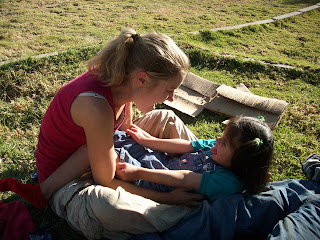The last couple of months have seen a few momentous happenings, here in South America, and in other parts of the world. I have worked some of them into the presentations I've been giving here in Bolivia and thought I'd give a round up here:
Firstly, May saw the beginning of a truly momentous event. For the first time in the history of humanity, a whole community of people are being forced to leave their homes, livelihoods and history due to the lost battle against rising sea-levels. This is the start of what is likely to be the largest displacement of people in the history of humanity. As low-lying nations become smaller and smaller, deserts spread leaving land unproductive for crops and animals, glaciers melt and droughts become more frequent, more and more people will earn the title 'climate change refugee' and be forced to join the burgeoning masses of people with nowhere to go. Who will take them in? And, the majority of them will be the poorest people of the world; those who have done the least to cause the problem in the first place.
Bolivia's highest glacier has gone
Another symbolic occurance has passed recently. Chacaltaya, not long ago the world's highest ski resort, has officially disappeared. It's predicted that most of the Andes Glaciers will have melted over the next 20 years, leaving tens of millions without water. Conflict is already on the rise between mountain communities, as vital water supplies dwindle, and communities positioned higher up attempt to divert water, leaving those below with reduced supplies.A compehensive study by Kofi Annan's Global Humanitarian Forum has looked at the human cost of climate change. This is the first time a study has saught to quantify climate change-related death rates and the number of those whose lives are being seriously affected.
http://www.ghf-geneva.org/index.cfm?uNewsID=157
Peru's indigenous fight for the their survival and for the survival of planet earth
The indigenous people living in Peru's Amazonian jungle have been mobilized for 7 weeks in response to the Peruvian governments attempts to drive them from their ancesterol homes and open the forest up to foreign corporations for logging and oil extraction. This is part of the NAFTA (North American Free Trade Agreement), the same trade agreement that initiated the Zapatista uprising in Mexico at the beginning of this century. When people are pushed and pushed until they face the potential elimination of their culture and way of life, they are often left with little choice but to resist and stand up for their rights. A wave of peaceful direct action such as road blockades and the occupation of foreign oil refineries was finaly met with government-backed violence just over a week ago, when helicopter gunships opened fire onto the thousands of unarmed indigenous people below, killing up to 50. The Peruvian Amazon is the largest swathe of Amazon rainforest outside of Peru and Garcia's goverment are intenet on opening up 70% of it to destructive resource extraction. Not only are these brave people fighting for their own survival, but they're unwittingly fighting for the survival of all of humanity at a time of climate crisis. If we loose the remaining rainforests of the world, we loose the battle against catastrophic climate change.
http://www.takepart.com/blog/2009/05/21/indigenous-peoples-fight-to-protect-peruvian-amazon-from-big-oil/http://www.amazonwatch.org/newsroom/view_news.php?id=1843
http://www.guardian.co.uk/environment/2009/jun/13/forests-environment-oil-companies

 I began a placement with a local environmental education organisation called Gaia Pacha, and Colette has been working for an orphanage for mentally handicapped children. I have been working on two main projects; the creation of a package of environmental education activities and games for local school childr
I began a placement with a local environmental education organisation called Gaia Pacha, and Colette has been working for an orphanage for mentally handicapped children. I have been working on two main projects; the creation of a package of environmental education activities and games for local school childr

 I've also been involved in the translation of script for the creation of English subtitles for a locally made film about climate change and it's affects on the people of Bolivia. This was both fascinating and sad, hearing first hand how poor, mountain communities are struggling to hold it together in the face of the climatic change which they have done the least to create.
I've also been involved in the translation of script for the creation of English subtitles for a locally made film about climate change and it's affects on the people of Bolivia. This was both fascinating and sad, hearing first hand how poor, mountain communities are struggling to hold it together in the face of the climatic change which they have done the least to create.
